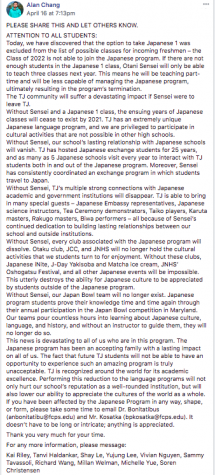Administration Reverses Decision to Eliminate Level One World Language Classes
Japanese students created a collage of their cultural activities that they believed made their program a key part of Jefferson. Photo courtesy of change.org
April 27, 2018

Following the administration’s decision to remove Japanese 1, Chinese 1, Spanish 1, and French 1 classes from future curriculum choices, Jefferson principal Dr. Ann Bonitatibus sent an email on April 25 to the incoming class of 2022, stating that the decision would be reversed and that all level one language classes previously offered at Jefferson would be available again for one year.
“It didn’t feel good from the very start having to make those hard decisions,” Bonitatibus said. “That’s why I was communicating with our district offices and saying, ‘This isn’t working for us. This is a really really hard decision for us to make.’ That challenge, combined with that gut feeling, led us to have a lot of conversations with different people.”
Bonitatibus acknowledged that the administration’s decision was rushed by a deadline established by the county.
“Fairfax County Public Schools has timelines for making staffing decisions, and this year it really was just a confluence of things where that deadline got moved up compared to past years,” Bonitatibus said. “It was really, really hard with spring break right at the same time we had to make decisions, and not even knowing yet who our freshman class was or which courses they would select.”
The administration’s reversal marked a resolution to the resistance from students and parents via Facebook, emails, and change.org petitions concerning the original choice to cut some language classes. (Petitions can be found here and here).
“This decision [to eliminate classes] was discussed widely between parents and students after they found out the change at the curriculum night on April 11, and I heard that SGA and some students had a meeting with the principal,” Japanese teacher Koji Otani said. “They expressed concerns during [the meeting].”
Koji Otani, known to his students as Otani Sensei, voiced concerns about certain language programs in particular if their level one classes were removed.
“Russian, German, and Japanese languages are not widely offered in the middle school level, so these languages will have [a] hard time maintaining the healthy class size if the school does not offer the level one classes for these languages,” Otani said. “Especially for the Japanese program, only a few students come to the level two class as the freshman. So the program may not be able to continue without level one.”

Otani’s students were also caught off-guard by the administration’s decision to remove Japanese 1, believing that the class was experiencing an upward trend in popularity.
“We were really surprised because the number of freshmen coming into the program had been rising over the past three years,” senior Tanvi Haldankar, an officer of Japanese Honor Society, said. “We also had this threat three years ago, but at the time, our J1 class was only eight people big, so I wouldn’t have been as surprised, but this year we had eighteen kids, so that came as a shock because we had such a large class.”
Senior Kai Riley, another Japanese Honor Society Officer, voiced his shock over the removal in light of the various activities organized by the Japanese Department over the years.
“Honestly, all the stuff we do as a language program, I don’t see why you would cut Japanese,” Riley said. “We have an exchange program, we have the New Year’s Festival, we perform at the Cherry Blossom Festival, we have the calligraphy, we have iNite, stuff like that. And so I was really surprised [as to] why you would cut Japanese.”
However, Bonitatibus felt that the administration had to make changes based on the low number of students projected to be enrolled in level one classes, a result of a new Fairfax County Public School policy.
“One of the greatest influencers right now of our level one languages, is the change in FCPS policy where middle school students can now earn level one and level two credit in middle school,” Bonitatibus said, “As you know, our TJ students are accelerated, so many freshmen come in already having earned either level one or level two credit.”
Bonitatibus stressed the importance of a more strategic placement of teachers. A decrease in language departments could mean staffing increases in other areas.
“Again, I can’t emphasize enough that it’s not about cutting, it’s about offering. I wanted to make sure that we were addressing other things in the school that it was important to put staffing toward. I’m pleased to say that we’re putting some additional staffing toward math,” Bonitatibus said, “We have to remember that the TJ that we have known and loved, and the needs that we had five years ago are not going to be the same needs that we have next year, and the next three to five years, so we have to be flexible. We have to be adaptable.”
Throughout the entire process, students, staff, and parents alike felt that their greatest concern was their inability to reach across and communicate to administration.
“We got no single straight answer from administration about this, and that naturally would leave us guessing as to why that would have happened,” Japanese Honor Society Officer senior Soren Christensen said. “Really, if you’re an administrator, you don’t want people to be spreading rumors [and] guessing about what your decisions are.”
Even despite of the language department’s success in bringing back level one classes for all seven world languages offered at Jefferson, Christensen expressed uneasiness over future communication between administration and the Jefferson community.
“The fact that it takes this much effort to actually have [the administration] hear our voices and concerns and have them act on that and communicate with us [is] concerning for the future,” Christensen said. “If it took this much effort for one thing, then if there were more problems with other departments in the future, is it going to take some school-wide movement to create change?”
Though the students previously felt disconcerted by the lack of information, the straightforward message sent by administration about the reversal promised a stronger relationship between the students and administration in the future.
“I think what we’ve heard just now [restoration of Japanese 1] is the first really clear, direct response that we’ve gotten from the top with regards to the large amount of feedback that’s coming in from these decisions in the last two or three weeks,” Japanese Honor Society Officer senior Millan Wellman said. “This will set a fair reminder to the new administration that will lead them to be more responsive to and communicative with the student body, and with interest groups as a whole in the future in a way that wasn’t achieved [here], but hopefully will be achieved in the future.”
Acknowledging the administration’s oversight, Bonitatibus expressed hopes for improvements in communication with staff and students in the future.
“When there is a critical failure point, that can have some very damaging effects, and we’re very well aware that when we do something that’s less than perfect, that can do a lot to erode trust and faith,” Bonitatibus said. “To rebuild that trust and faith, I think we take steps like we’re doing right now to say, ‘You know what, this probably did seem like the rug [was] being taken out from everybody unexpectedly, so how can we go back and for next year, do what’s right, put these offerings out there.’”







